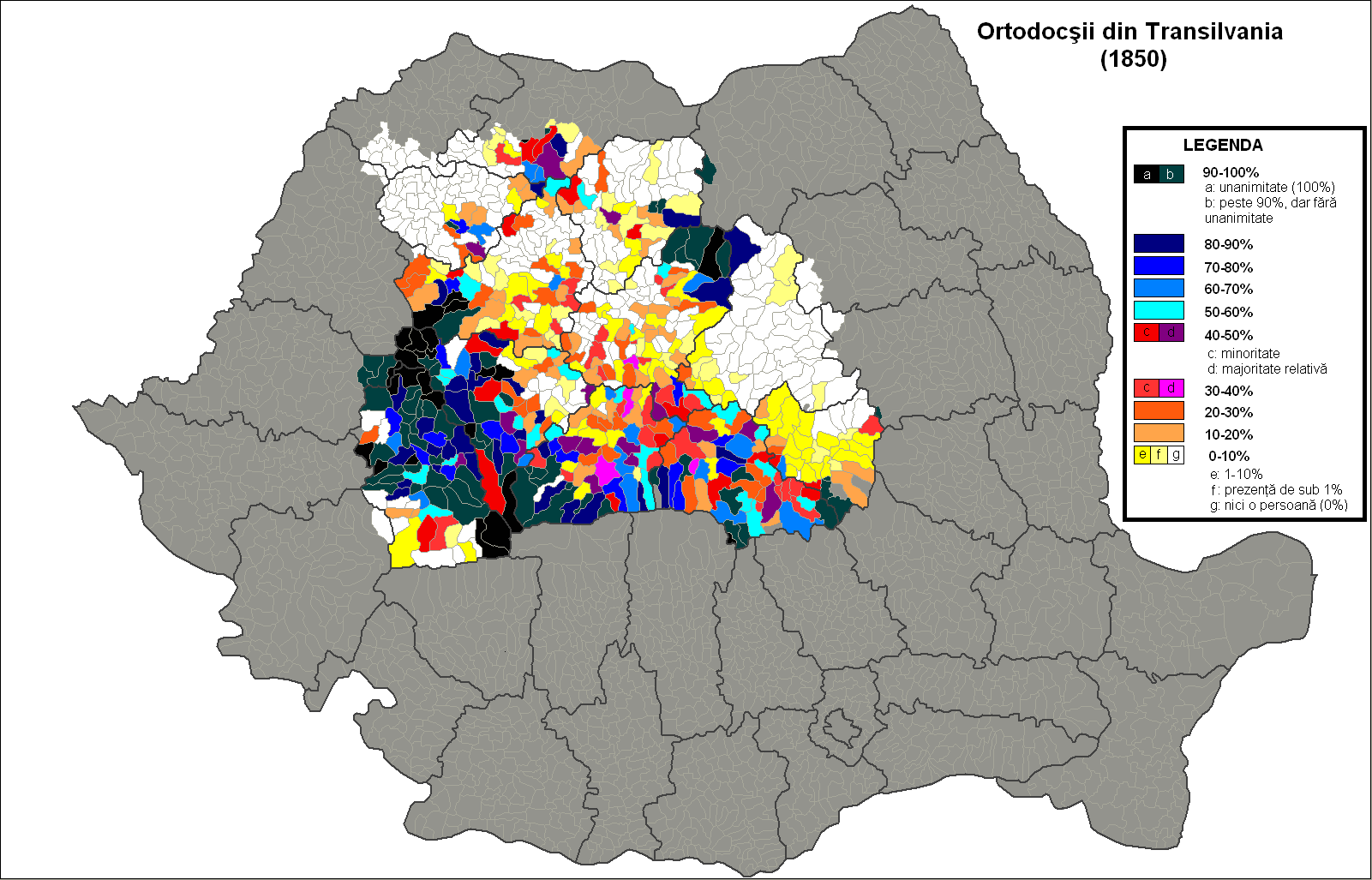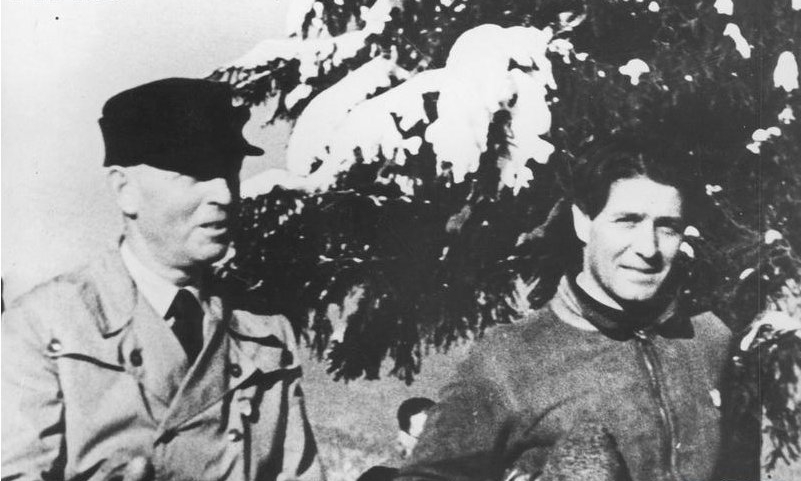|
Gheorghe Clime
Gheorghe Clime (b. Oancea, 1889 – d. Râmnicu Sărat, 1939) was a Romanian fascist politician, founding member of the Iron Guard, and president of its electoral wing, Totul pentru Țară. Early life Gheorghe Clime was born in 1889 in Oancea, Covurlui County (today Galați County), a commune in the historic region of Moldavia. He graduated from the Școală Superioară de Silvicultură (Academy of Silviculture) in Brănești, Ilfov County, a city located about 25km from the Romanian capital, Bucharest, where he trained as a forestry engineer. Following this, he was licensed in law, and practiced as a lawyer in Domnești, Argeș County. Political activity Clime first became involved in nationalist political organizing in his school days, first as a member of the nationalist group "Avântul", where he became acquainted with philosopher Nae Ionescu. He later became acquainted with A. C. Cuza, the founder of the National-Christian Defense League, an antisemitic and ultrana ... [...More Info...] [...Related Items...] OR: [Wikipedia] [Google] [Baidu] |
Gheorghe Clime
Gheorghe Clime (b. Oancea, 1889 – d. Râmnicu Sărat, 1939) was a Romanian fascist politician, founding member of the Iron Guard, and president of its electoral wing, Totul pentru Țară. Early life Gheorghe Clime was born in 1889 in Oancea, Covurlui County (today Galați County), a commune in the historic region of Moldavia. He graduated from the Școală Superioară de Silvicultură (Academy of Silviculture) in Brănești, Ilfov County, a city located about 25km from the Romanian capital, Bucharest, where he trained as a forestry engineer. Following this, he was licensed in law, and practiced as a lawyer in Domnești, Argeș County. Political activity Clime first became involved in nationalist political organizing in his school days, first as a member of the nationalist group "Avântul", where he became acquainted with philosopher Nae Ionescu. He later became acquainted with A. C. Cuza, the founder of the National-Christian Defense League, an antisemitic and ultrana ... [...More Info...] [...Related Items...] OR: [Wikipedia] [Google] [Baidu] |
Argeș County
Argeș County () is a county ('' județ'') of Romania, in Muntenia, with the capital city at Pitești. Demographics On 20 October 2011, it had a population of 612,431 and the population density was 89/km2. * Romanians – 97% * Roma (Gypsies) and other ethnic groups – 3% Geography This county has a total area of 6,862 km2. The landforms can be split into 3 distinctive parts. In the north side there are the mountains, from the Southern Carpathians group – the Făgăraș Mountains with Moldoveanu Peak (2,544 m), Negoiu Peak (2,535 m) and Vânătoarea lui Buteanu peak (2,508 m) towering the region, and in the North-East part the Leaotă Mountains. Between them there is a pass towards Brașov, the Rucăr-Bran Passage. The heights decrease, and in the center there are the sub-carpathian hills, with heights around 800 m, crossed with very deep valleys. In the south there is the northern part of the Romanian Plain. The main river that crosses the county is the Arge� ... [...More Info...] [...Related Items...] OR: [Wikipedia] [Google] [Baidu] |
Ion G
An ion () is an atom or molecule with a net electrical charge. The charge of an electron is considered to be negative by convention and this charge is equal and opposite to the charge of a proton, which is considered to be positive by convention. The net charge of an ion is not zero because its total number of electrons is unequal to its total number of protons. A cation is a positively charged ion with fewer electrons than protons while an anion is a negatively charged ion with more electrons than protons. Opposite electric charges are pulled towards one another by electrostatic force, so cations and anions attract each other and readily form ionic compounds. Ions consisting of only a single atom are termed atomic or monatomic ions, while two or more atoms form molecular ions or polyatomic ions. In the case of physical ionization in a fluid (gas or liquid), "ion pairs" are created by spontaneous molecule collisions, where each generated pair consists of a free electron and a ... [...More Info...] [...Related Items...] OR: [Wikipedia] [Google] [Baidu] |
1932 Romanian General Election
General elections were held in Romania in July 1932.Dieter Nohlen & Philip Stöver (2010) ''Elections in Europe: A data handbook'', p1591 The Chamber of Deputies was elected on 17 July, whilst the Senate was elected in three stages on 20, 24 and 26 July. The result was a victory for the governing National Peasants' Party- German Party alliance, which won 274 of the 387 seats in the Chamber of Deputies and 104 of the 113 seats in the Senate elected through universal male vote.Nohlen & Stöver, p1610-1611 Of the 274 Chamber seats, 265 were taken by the National Peasant's Party and nine by the German Party. Results Chamber of Deputies Senate Notes References {{Romanian elections Parliamentary elections in Romania Romania Election and referendum articles with incomplete results Romania General A general officer is an Officer (armed forces), officer of highest military ranks, high rank in the army, armies, and in some nations' air forces, space forces, and marines or n ... [...More Info...] [...Related Items...] OR: [Wikipedia] [Google] [Baidu] |
Radu Mironovici
Radu Mironovici (30 July 1899 – 29 July 1979) was a founding member of the Legionary Movement, a far-right movement in Romania. Early life and education Radu Mironovici was born on 30 July 1899 in Arbore, a commune then located within the Duchy of Bukovina, at the time under Habsburg rule within the Austro-Hungarian Empire (today located in Suceava County, Romania). During World War I, he fled to Iași in the historical region of Moldavia (and from 1916–1918, the capital of Romania). There he enrolled as a student of electrical engineering at the University of Iași. During his studies he met and became close with Corneliu Zelea Codreanu, a young member of A. C. Cuza's National-Christian Defense League ("LANC"); he was also close with several other antisemitic student activists. He served as general secretary of the "'Avram Iancu' Academic Society" and was a reserve officer. Political activism During his time as a student in Iași, Mironovici became involved ... [...More Info...] [...Related Items...] OR: [Wikipedia] [Google] [Baidu] |
Corneliu Georgescu
Corneliu is a Romanian given name, derived from Latin '' Cornelius''. Corneliu may refer to: * Corneliu Baba *Corneliu Bogdan *Corneliu Calotescu *Corneliu Carp * Corneliu Chisu *Corneliu Ciontu * Corneliu Zelea Codreanu *Corneliu Codreanu (footballer) * Corneliu Coposu *Corneliu Dragalina *Corneliu E. Giurgea *Corneliu Ion * Corneliu Ionescu * Corneliu Mănescu *Corneliu Moldovanu *Corneliu Oros *Corneliu Papură *Corneliu M. Popescu * Corneliu Porumboiu *Corneliu Robe *Corneliu Stroe *Corneliu Șumuleanu *Corneliu Teodorini Corneliu Teodorini (18 September 1893 – 10 July 1976) was a Romanian general during World War II. He was a recipient of the Knight's Cross of the Iron Cross with Oak Leaves and the Order of Michael the Brave, 2nd Class. He was born in Craiova ... * Corneliu Vadim Tudor {{given name Romanian masculine given names ... [...More Info...] [...Related Items...] OR: [Wikipedia] [Google] [Baidu] |
Ilie Gârneață
Ilie Gârneață (1898 – 28 May 1971) was a lawyer and founding member of the Legionary Movement, a far-right movement in Romania. Biography Gârneață was born in Iași, Kingdom of Romania, in 1898. He served as a volunteer in the World War I. First attending a military school in Botoșani, he later studied law in Iași. In 1922, Corneliu Zelea Codreanu appointed him president of the local chapter of the Association of Christian Students. Gârneață's family lived in Darabani, in Western Moldavia. In October 1923, Gârneaţă and five others (including Corneliu Zelea Codreanu, Ion Moța, Radu Mironovici, Teodosie Popescu, and Corneliu Georgescu) were arrested in Bucharest under suspicion of attempting to spark a civil war in Romania. The group, who became known as the ''Văcăreșteni'' (named after the prison at Văcărești, where they were held), were accused of amassing arms and plotting to kill government ministers and Jewish business figures. In 1924, he was i ... [...More Info...] [...Related Items...] OR: [Wikipedia] [Google] [Baidu] |
Ion Moța
Ion I. Moța (5 July 1902 — 13 January 1937) was the deputy leader of the Romanian fascist Legionary Movement (Iron Guard), killed in battle during the Spanish Civil War. Biography Son of the nationalist Orthodox priest Ioan Moța, who edited a journal called ''Libertatea'' ("Liberty"), Ion I. Moța completed his baccalaureate at Bucharest's Saint Sava National College, then studied law in Paris (at the Sorbonne, 1920-1921), Cluj, and Iași. After being suspended from attending university in Romania, he returned to France. His thesis, finished in 1932 at the University of Grenoble, was entitled " Juridical Security in the Community of Nations", later published in Romania as "The League of Nations as a Vicious and Dangerous Ideal". At Cluj, he founded Acțiunea Românească ("Romanian Action"), a nationalist group inspired by Charles Maurras' Action Française. This organization fused with A. C. Cuza's National-Christian Defense League in 1925. Moța met Corneliu Zelea ... [...More Info...] [...Related Items...] OR: [Wikipedia] [Google] [Baidu] |
Romanian Orthodox Church
The Romanian Orthodox Church (ROC; ro, Biserica Ortodoxă Română, ), or Patriarchate of Romania, is an autocephalous Eastern Orthodox church in full communion with other Eastern Orthodox Christian denomination, Christian churches, and one of the nine patriarchates in the Eastern Orthodox Church organization, Eastern Orthodox Church. Since 1925, the church's Primate (bishop), Primate bears the title of Patriarch. Its jurisdiction covers the territories of Romania and Moldova, with additional dioceses for Romanians living in nearby Serbia and Hungary, as well as for diaspora communities in Central Europe, Central and Western Europe, North America and Oceania. It is the only autocephalous church within Eastern Orthodox Church, Eastern Orthodoxy to have a Romance languages, Romance language for liturgical use. The majority of Romania's population (16,367,267, or 85.9% of those for whom data were available, according to the 2011 census data), as well as some 720,000 Moldovans, belo ... [...More Info...] [...Related Items...] OR: [Wikipedia] [Google] [Baidu] |
Corneliu Zelea Codreanu
Corneliu Zelea Codreanu (; born Corneliu Codreanu, according to his birth certificate; 13 September 1899 – 30 November 1938) was a Romanian politician of the far right, the founder and charismatic leader of the Iron Guard or ''The Legion of the Archangel Michael'' (also known as the ''Legionary Movement''), an ultranationalist and violently antisemitic organization active throughout most of the interwar period. Generally seen as the main variety of local fascism, and noted for its mystical and Romanian Orthodox-inspired revolutionary message, it gained prominence on the Romanian political stage, coming into conflict with the political establishment and the democratic forces, and often resorting to terrorism. The Legionnaires traditionally referred to Codreanu as ''Căpitanul'' ("The Captain"), and he held absolute authority over the organization until his death. Codreanu, who began his career in the wake of World War I as an anticommunist and antisemitic agitator associ ... [...More Info...] [...Related Items...] OR: [Wikipedia] [Google] [Baidu] |
Ultranationalism
Ultranationalism or extreme nationalism is an extreme form of nationalism in which a country asserts or maintains detrimental hegemony, supremacy, or other forms of control over other nations (usually through violent coercion) to pursue its specific interests. Ultranationalist entities have been associated with the engagement of political violence even during peacetime. In ideological terms, scholars such as British political theorist Roger Griffin have found that ultranationalism arises from seeing modern nation-states as living organisms directly akin to physical people such that they can decay, grow, die, and additionally experience rebirth. Political campaigners have divided societies in stark mythological ways between those perceived as degenerately inferior and those perceived as a part of a great cultural destiny. Ultranationalism is an aspect of fascism, with historic governments such as the regime of Nazi Germany building on ultranationalist foundations using specific ... [...More Info...] [...Related Items...] OR: [Wikipedia] [Google] [Baidu] |



